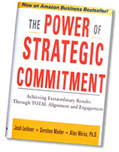
This month, we begin a series which will run every Wednesday over the next four weeks and focus on the topic of How Consensus May Be Hurting Your Company. For our first post in this series, we start by discussing the way agenda-driven meetings may be robbing your company of authentic conversations.
A key principle of generating total alignment and engagement is ensuring that you are always working backward from a deliberate, desired future — rather than merely extrapolating or perpetrating business as usual. When it comes to meetings — which consume enormous amounts of most managers’ time — this principle can make the difference between meetings that make a big impact, and those that waste valuable time.
To begin with, most meetings are designed backwards. The agenda planning starts with the questions:
How much time do we have? and What do people think we should talk about?
The reason we say these meetings are designed backwards is because the time allocated for the meeting should be determined instead by answers to the more useful questions:
- What do we want to accomplish?
- What do we want people to leave the meeting with?
- What could we do during the meeting to achieve the desired objectives?
The answers to these questions will determine whether the meeting is worth having, who should attend, what should be covered and how much time it should take.
Once the purpose and agenda are agreed upon, and the meeting commences, the agenda should also be managed to produce the agreed outcomes, rather than having success determined by whether the planned schedule was adhered to. We have repeatedly seen meaningful, productive conversations interrupted by a timekeeper who thought his or her job was to play the role of the agenda police.
This orientation around time rather than outcomes means discussions that may have served their purpose might be extended unnecessarily, while other conversations that are yielding unexpected fruits might be shut down once the time allocated to them has been exceeded.
We invite your comments and questions about how to make your meetings more effective. Next week, we will explore three specific ways to re-tool your meetings for more commitment and engagement.

